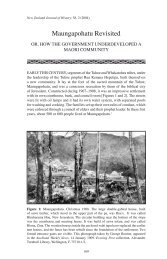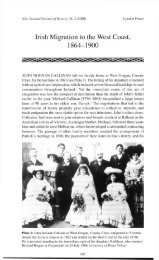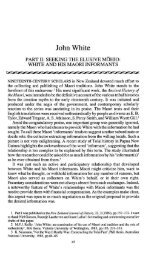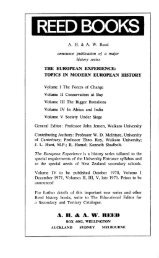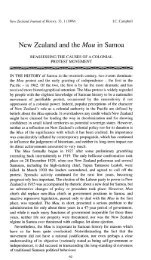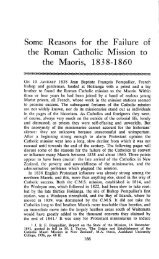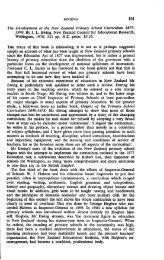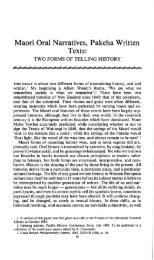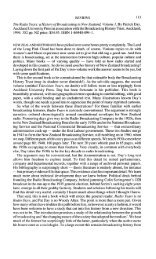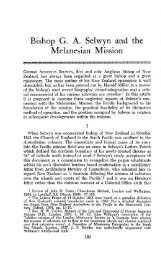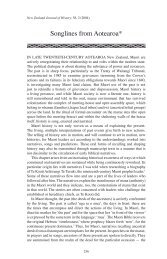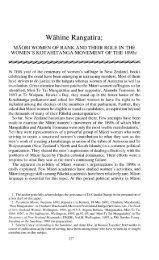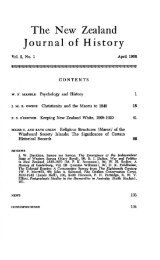Friendly Societies 1842-1938 - New Zealand Journal of History ...
Friendly Societies 1842-1938 - New Zealand Journal of History ...
Friendly Societies 1842-1938 - New Zealand Journal of History ...
You also want an ePaper? Increase the reach of your titles
YUMPU automatically turns print PDFs into web optimized ePapers that Google loves.
124 JENNIFER CARL YON<br />
In contrast to Thomson, David Green has presented an overly positive picture<br />
<strong>of</strong> friendly societies both in <strong>New</strong> <strong>Zealand</strong> and elsewhere. 15 He has held them up<br />
as exemplars <strong>of</strong> the Victorian virtues <strong>of</strong> thrift, mutual support and independent<br />
self-help. Green maintains that these associations <strong>of</strong>fered superior quality<br />
services and provided opportunities for developing the personal skills 'necessary<br />
for liberty and independence'. He argues that the welfare state has eroded any<br />
sense <strong>of</strong> personal responsibility and mutual obligation. Without any real historical<br />
research or in-depth investigation into <strong>New</strong> <strong>Zealand</strong> friendly societies, he<br />
recommends that a solution to the present welfare dependency would be to move<br />
welfare away from the state and once again make it the responsibility <strong>of</strong><br />
individuals to organize their own independent welfare provision through voluntary<br />
mutual aid associations such as the friendly societies. 16<br />
While I believe that, in his determination to highlight the inadequacies <strong>of</strong> the<br />
welfare state, Green has painted a too uncritical picture <strong>of</strong> friendly societies and<br />
has overstated their role and impact, Thomson conversely has focused only on<br />
their limitations, which has led him to dismiss almost completely their relevance<br />
and usefulness in the lives <strong>of</strong> many working people before <strong>1938</strong>. I hope this<br />
article will go some way towards redressing the balance.<br />
In an era when there were no state income maintenance schemes and any state<br />
provision <strong>of</strong> welfare was limited and restrictive, for the skilled workers who<br />
could afford regular contributions, friendly societies were one <strong>of</strong> the most<br />
comprehensive forms <strong>of</strong> insurance against the calamitous effects <strong>of</strong> illness or<br />
accident to the wage earner. The rules <strong>of</strong> the United Ancient Order <strong>of</strong> Druids,<br />
which are representative <strong>of</strong> all friendly societies, illustrate the wide range <strong>of</strong><br />
assistance <strong>of</strong>fered to members. They aimed:<br />
(1) To provide a certain weekly allowance in case <strong>of</strong> sickness or accident to contributing<br />
members.<br />
(2) To provide as may be agreed upon with the Lodge Medical Officer surgical aid and<br />
medicine to members, their wives and children; and to the widowed mothers <strong>of</strong><br />
unmarried members; and the widows and children <strong>of</strong> deceased members.<br />
(3) To provide a certain sum on the death <strong>of</strong> a member or his wife, and also in certain<br />
cases, the widow <strong>of</strong> a late member, for the purposes <strong>of</strong> paying the burial expenses.<br />
15 David Green, Working-Class Patients and the Medical Establishment. Self-help in Britain<br />
from the mid-nineteenth century to 1948, Aldershott, 1985. David Green and Lawrence G. Cromwell,<br />
Mutual Aid or Welfare State, Australia's <strong>Friendly</strong> <strong>Societies</strong>, Sydney, 1984.<br />
16 David Green, From Welfare State to Civil Society. Welfare that Works in <strong>New</strong> <strong>Zealand</strong>,<br />
Wellington, 1996. He based his assumptions about <strong>New</strong> <strong>Zealand</strong> friendly societies largely on his<br />
research into Australian and British friendly societies. He also recommended the same solution to<br />
British welfare problems in David Green, Reinventing Civil Society. The Rediscovery <strong>of</strong> Welfare<br />
without Politics, London, 1993.



